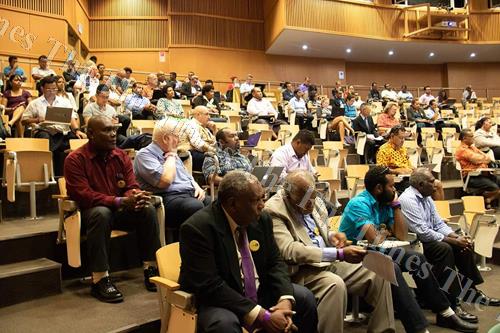HE transport sector in Fiji accounts for 8 per cent of the gross domestic product with most the fuel imported used in the sector, says Minister for Agriculture, Rural & Maritime Development & National Disaster Management & Meteorological Services, Inia Seruiratu. Mr Seruiratu said in Fiji, 19 per cent of merchandise imports comprised fuel.
He was speaking at the opening of the three-day event on Pacific Islands Transport Forum which started at the USP Japan ICT centre yesterday.
“According to Fiji’s nationally determined contribution (NDC), around 75 per cent of greenhouse gas emissions (GHG) in the PICs come from the transport sector.
Mr Seruiratu said the theme of the forum — Turning the Tide: Decarbonising Pacific Transport — was close to him as Fiji’s high level climate champion.
Organised by the Republic of the Marshall Islands, University of the South Pacific, COP23 Secretariat along with funding partners, private sector and individuals, Mr Seruiratu said the forum provided a platform to showcase some of the zero and low carbon technologies available in the transport sector that may be appropriate to our islands.
“It also offers an opportunity to the public and the private sectors to discuss options that are available and what may be available in the near future. “We all know how dependant our economies are on imported fossil fuels.
In Fiji, 19 per cent of merchandise imports comprised fuel.
“Most of our fuel we import is used in the transport sector. Our island nations are all dependent on transport; in fact we are dependent on transport for our daily livelihood; for food, access to markets, health, education, you name it, we need transport.”
Mr Seruiratu said the shipping industry was set to agree to its first global emissions target, with a plan to cut GHG emissions by at least 50 per cent by 2050 — a goal that would require the shipping industry to completely redesign their fleets around new types of fuel.
“In Fiji’s context, we are working with the Pacific Community (SPC) to formulate our national maritime energy efficiency index by retrofitting one of our Government vessels using solar as an alternative energy source for all lighting.”
USP’s deputy vice-chancellor, research, innovation and international, Professor Derrick Armstrong said the university had introduced new courses in sustainable sea transport, shipping and ports as part of its undergraduate program through the School of Maritime Studies.
“Over the past few years the challenge of tackling our currently unsustainable transport, which is entirely dependent on imported fossil fuels, has been recognised by more and more people and organisations,” he said.






